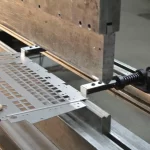In today’s competitive business landscape, finding the best press brake to meet your business needs is crucial for achieving success and maintaining a competitive edge. Whether you are in manufacturing, retail, or any other industry, selecting the right machine can significantly impact your productivity, efficiency, and profitability.
This article aims to provide you with a comprehensive guide on how to locate the ideal press brake for your specific requirements.
To begin this process, it is essential to assess your business needs carefully. Understand the tasks and operations that require automation or assistance from a press brake.
Next, conduct thorough research to explore the available options in the market. Consider factors such as functionality, features, and compatibility with existing systems. Look for press brakes that offer precision, versatility, and user-friendly controls.
When shortlisting potential press brakes, evaluate their performance and reliability based on technical specifications and customer reviews. Look for machines that have a track record of delivering accurate and consistent results. Additionally, consider long-term costs associated with maintenance and potential upgrades. Look for press brakes that have a reputation for durability and require minimal maintenance.
Furthermore, consider the support and training provided by the manufacturer. A reputable company will offer comprehensive customer support and training to ensure you can maximize the potential of your press brake.
By following these steps and making an informed decision based on objective analysis of your business requirements and available options in the market, you can find the best press brake that perfectly aligns with your needs while ensuring optimal productivity and growth for your organization.
Key Takeaways
- Assess business requirements carefully to identify tasks and operations that require automation or assistance from machinery.
- Conduct thorough research to explore available options in the market, considering functionality, features, and compatibility with existing systems.
- Evaluate performance and reliability based on technical specifications and customer reviews to make an informed decision.
- Consider long-term costs associated with maintenance and potential upgrades, choosing cost-effective solutions that minimize expenses over time.
Assessing Your Business Requirements
Assessing business requirements is essential to effectively identify the most suitable machine for optimal performance and productivity. Understanding the needs of the business is crucial for ensuring growth and success.
Firstly, it is important to evaluate the current state of the business and identify areas that require improvement or expansion. This could include increased production capacity, enhanced efficiency, or improved quality control.
Secondly, budget constraints need to be taken into account when selecting a machine. It is necessary to determine how much can be allocated towards this investment without compromising other aspects of the business.
Evaluating these requirements will enable businesses to make informed decisions regarding the selection of a machine that aligns with their goals and financial capabilities. By doing so, businesses can maximize their potential for growth while staying within their budget limits.

Researching Available Options
When exploring the market, it is essential to conduct thorough investigations into the range of available options for a suitable piece of equipment that aligns with one’s specific operational requirements.
Comparing prices is an integral part of this research process. It allows businesses to evaluate different machines within their budget and ensures they are getting the best value for their investment. By comparing prices, businesses can identify any discrepancies or inflated costs and make informed decisions based on their financial capabilities.
In addition to comparing prices, examining customer reviews is another crucial step in researching available options. Customer reviews provide valuable insights into the performance and reliability of a machine from those who have already used it. They can highlight potential issues or advantages that may not be apparent from simply looking at product specifications. By considering customer feedback, businesses can make more informed choices and select a machine that has a track record of meeting their needs effectively.
Overall, by thoroughly researching available options through comparing prices and examining customer reviews, businesses can ensure they find the perfect machine that meets their specific operational requirements while also providing them with good value for their investment.
Evaluating Machine Performance and Reliability
Evaluating the performance and reliability of different equipment options allows for a comprehensive understanding of their capabilities and dependability. When comparing machine specifications, it is important to consider factors such as processing power, speed, capacity, and energy efficiency. These specifications directly impact the machine’s ability to handle specific business needs efficiently.
Seeking customer reviews also provides valuable insights into the real-world performance and reliability of the machines under consideration. By analyzing feedback from other businesses that have used similar equipment, one can gain a better understanding of potential issues or benefits associated with each option. Moreover, customer reviews can offer insights into long-term reliability and durability of the machines in question.
Ultimately, evaluating both machine specifications and customer reviews aids in selecting the perfect machine for specific business requirements while ensuring optimal performance and reliability.
Considering Long-term Costs and Maintenance
Considering the long-term costs and maintenance of different equipment options provides a comprehensive understanding of the financial implications and upkeep required, allowing businesses to make informed decisions that align with their budget and operational requirements.
When evaluating machinery for business needs, it is essential to consider cost-effective solutions that minimize expenses over time. This involves assessing not only the initial purchase price but also the ongoing costs associated with maintenance, repairs, and replacement parts.
By choosing equipment with a reputation for reliability and durability, businesses can reduce the frequency of breakdowns and minimize downtime. Additionally, implementing preventative maintenance measures such as regular inspections, servicing, and cleaning can extend the lifespan of machinery and prevent costly repairs in the future.
Overall, considering long-term costs and maintenance helps businesses optimize their investments by selecting equipment that offers both performance efficiency and financial sustainability.
Making an Informed Decision
To ensure a wise investment, it is crucial to carefully analyze all available information and make an informed decision regarding the most suitable equipment option.
When considering the purchase of a machine for your business needs, it is necessary to weigh the pros and cons of each potential choice. This involves thoroughly examining the features, capabilities, and performance of different machines in relation to your specific requirements.
Additionally, analyzing budget constraints is essential to avoid overspending or compromising on quality. By comparing prices, warranty options, and maintenance costs, you can determine the long-term affordability of each machine. It is important to consider not only the initial purchase price but also any additional expenses that may arise in terms of repairs or upgrades.
Taking these factors into account will enable you to make an informed decision that aligns with both your business needs and financial capabilities.
Conclusion
In conclusion, locating the ideal machine for your business requires a thorough assessment of your specific requirements.
It is crucial to conduct extensive research on the available options and carefully evaluate their performance and reliability.
Additionally, considering long-term costs and maintenance is essential in making an informed decision.
By following these steps and adopting a technical approach, you can ensure that you choose the most suitable machine that meets your business needs effectively and efficiently.
You May Also Like:


